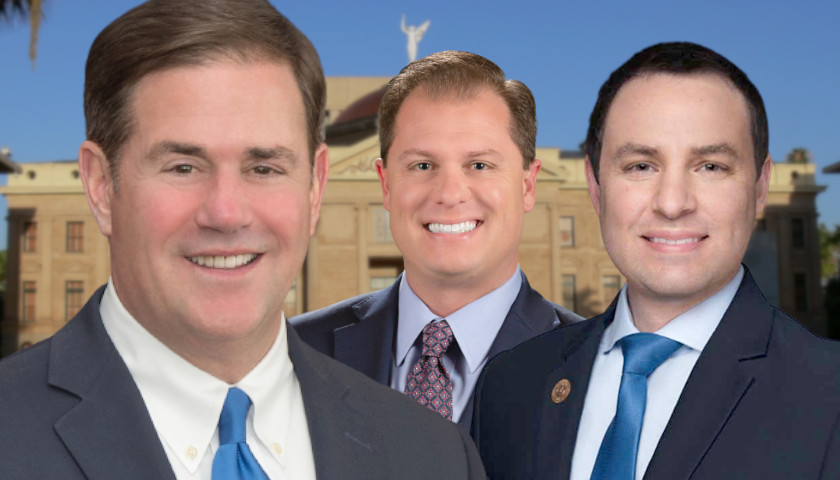Arizona enacted historic tax cuts last year changing the state’s tax code law to mostly a 2.5% flat tax rate. But opponents collected enough signatures to put an initiative on the ballot this fall, Prop. 307, that would reverse the legislation. In response, Republican state legislators are working with Gov. Doug Ducey to pass legislation that would make the initiative null and void — and maybe implement even more striking tax cuts.
State Rep. Jake Hoffman (R-Queen Creek), who sponsored legislation last year that would have repealed and replaced the historic tax cuts with an even more far-reaching 1.5% tax rate, told The Arizona Sun Times, “I told the Governor’s office that the 2.5% tax rate he’s pushing for can only be the starting point. With yet another year of record budget surpluses of nearly $4 billion, the people of Arizona are being overtaxed. We must cut taxes even more during the budget process.”
According to State Sen. J.D. Mesnard (R-Chandler), legislators and Ducey are considering holding a special session to deal with it, since they would need to repeal the previous law first. It is crucial for the Legislature to act now, since the Arizona Constitution prohibits the legislature from repealing or altering ballot initiatives once they have been enacted into law. The only way to change them after that is through another ballot initiative.
Of course, if legislators pass a bill to preempt the initiative, opponents could turn around at the last minute and collect signatures to get a new initiative on the ballot to repeal it. They would have 90 days after the final enactment to gather 118,823 valid signatures on petitions.
The background of the historic tax cuts and subsequent litigation is complicated. The 2.5% rate will go into effect as soon as next year depending on revenues. Tax rates are currently staggered from 2.59% to 4.5%. The tax cut legislation was passed in response to Prop. 208, a ballot initiative called the Invest in Education Act, which slapped a 3.5% tax surcharge on income above $250,000 for individuals and $500,000 for married couples filing jointly, upping their rate to as high as 8%. The tax cut legislation brought the ceiling back down to 4.5% by having the state pay anything above that.
The Arizona Free Enterprise Club (AFEC) filed two lawsuits against Prop. 307. One contended that the Arizona Constitution prohibits issues related to the support and maintenance of state government to be referred to the ballot. A second lawsuit asserted that there were numerous mistakes made by people when they signed up to circulate petitions to refer the tax cut to voters. If all the signatures collected by those people are invalidated, the initiative would not have enough valid ones to qualify for the ballot. It asserts, “the National Education Association (NEA) and Stand for Children, two out-of-state special interest groups, purchased the referendum against historic tax cuts that Republicans delivered earlier this year.”
So far, a trial court judge has ruled against AFEC on the first lawsuit, which AFEC intends to appeal.
The Arizona Supreme Court ruled last year that Prop 208 could be challenged on the basis of the state’s constitutional spending limits for K-12 schools, meaning they were already receiving maximum ceiling amounts. The court punted it back to the trial court, which ruled a few days ago that Prop. 208 was unconstitutional.
This means the legislation bringing the ceiling back down to 4.5% is no longer necessary, and some legislators now want to find other ways to spend that money. Rep. David Cook (R-Globe) told Capitol Media that he’d like to see it applied to eliminate the 18-cent-a-gallon gas tax while prices at the pump are surging.
A coalition of left-leaning education groups is behind Prop. 307. However, Arizona’s spending on schools has significantly increased in recent years. According to a state report, “In fiscal year 2021, the State per pupil spending and instructional spending percentage continued an upward trend, and the State average teacher salary increased to $56,349 — a 16.5 percent increase over 2017’s average.” The Arizona Free Enterprise Club performed an analysis in December and found that “Arizona is funding education at historic levels.”
Additionally, Arizona is bringing in more tax revenues than ever, increasing each year since 2016, from over $11 billion in 2016 to well over $17 billion in 2021.
Invest in Arizona and its companion organizations also attempted to get another initiative on the ballot, R-06-2021, which would have repealed the small business portion, but it failed to qualify due to lack of signatures.
Ducey said the historic tax cuts amount to $300 a year for the “average Arizonan.” AFEC said they were necessary because the high 8% rate “put businesses in the state at a competitive disadvantage with Texas and Nevada which have no income tax, while New Mexico has a top rate of 4.9 percent.”
– – –
Rachel Alexander is a reporter at The Arizona Sun Times and The Star News Network. Follow Rachel on Twitter. Email tips to [email protected].
Background Photo “Arizona Capitol” by Wars. CC BY-SA 2.5








